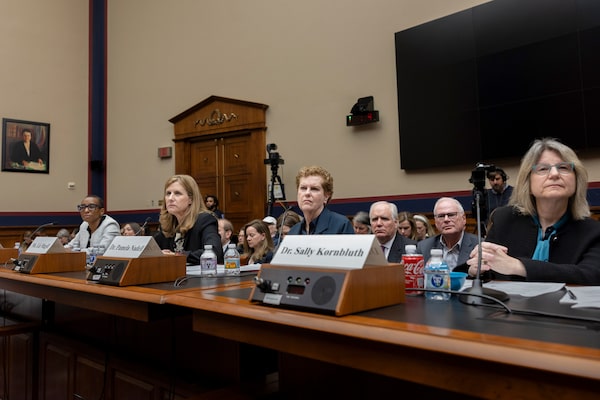
From the left, Claudine Gay, president of Harvard University; Elizabeth Magill, president of the University of Pennsylvania; Pamela Nadell, a professor at American University; and Sally Kornbluth, president of the Massachusetts Institute of Technology, appear at a House Committee on Education and the Workforce hearing on Capitol Hill regarding antisemitism in schools, on Dec. 5.TOM BRENNER/The New York Times News Service
What a sorry sight. The crisis in American education was on full display last week as the presidents of three of the gold-standard institutions of higher learning in the country incriminated themselves at a congressional hearing.
Instead of giving a straight answer on whether students calling for the genocide of Jews constituted harassment, the presidents of Harvard, the University of Pennsylvania and the Massachusetts Institute of Technology drowned themselves in evasive legalese.
In doing so, they played right into the hands of the legions claiming, not without merit, that colleges are out-of-touch bastions of leftist elitism. It was Rep. Elise Stefanik – an election-denier no less, and a Donald Trump lackey – who impaled them.
The credibility of American higher education could ill afford this. But the system had this reckoning coming. As Fareed Zakaria has noted, there’s been a broad shift in the world-class centres of excellence to institutions pushing political agendas, engaging in political and social engineering instead of academic merit.
If opinion surveys are to be believed, a majority of Republicans now believe colleges and universities have a negative effect on the country. A Gallup poll this year showed that while 56 per cent of Republicans had quite a lot or a great deal of confidence in higher education in 2015, around the time that Mr. Trump was on the rise, the number now is down to 19 per cent. That’s a dramatic shift. Meanwhile Democrat numbers have remained mostly unchanged, with nearly 60 per cent having confidence in the system.
Republicans believe – and surveys of faculty members back them up – that American colleges and universities have been overtaken by liberal ideology. The faculty bias issue has been around for a long time, but it is coming to a head now.
In addition to politicization, the once-great American education system is badly hurting on several other fronts, sharply decreased enrolments and sharply higher costs chief among them.
In the fall of 2010, more than 18 million undergraduates were enrolled in American colleges and universities; by 2021, that number was 15.5 million. According to the New York Times, the percentage of adults between 25 and 34 who have attained a postsecondary degree is now 15 percentage points higher in Canada.
Over the past three decades in the U.S., costs have almost doubled for four-year private colleges and more than doubled for the public ones. In Canada, public-university tuition fees average $6,693 a year. In the U.S, it costs more than two to four times that much, depending on whether the student comes from in- or out-of-state; for private colleges, it’s almost 10 times more.
Canadian universities have no shortage of problems: wokeism run amok, liberal ideological bias, a lack of provincial funding, degrees to nowhere. It is perhaps fortunate that none of our university presidents has had to answer to Parliament for the virulent antisemitism that has appeared on some campuses. They may have embarrassed themselves like their American counterparts.
But problems in postsecondary education in Canada hardly compare to the situation south of the border.
Respect and support for higher learning in the U.S. has been set back by the rise of populism and the hard right with their anti-intellectual proclivities. As satirist Andy Borowitz notes in his non-satirical book, Profiles in Ignorance, Americans used to expect their politicians to be more learned than the average citizen, and academic pedigree was respected. Things started to change, he writes, with president Ronald Reagan, who possessed a mind which, as described by his speechwriter Peggy Noonan, was “barren terrain.” But self-deprecating humour helped him get away with it. Responding to criticism that he was a slacker who dozed off at cabinet meetings, Mr. Reagan countered – a good one from the Gipper – that in fact his workload had caused him “many a sleepless afternoon.”
George W. Bush was by no means deep, but Fox News helped him and other Republicans along by fostering a climate in which being erudite was derided as being elitist. There came the point where politicians with high academic qualifications sought to hide them for fear of the elitist label. What a disgrace. If John F. Kennedy wasn’t already doing multiple rollovers in his grave, he should have been.
One of the main features of Ron DeSantis’s anti-woke governance in Florida has been his series of orders on what universities can and cannot teach. Watch for this degree of meddling, given the embarrassment of the university presidents, to be copied in other states.
Higher learning, like so much else in the U.S., has become a political football. It makes for more woe for the Great Republic. A society where education is in decline is a society that is itself in decline.
 Lawrence Martin
Lawrence Martin